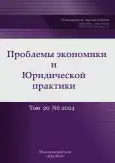Gaps in the International Legal Regulation of Intercivilizational Interaction on the Example of Russian-Mongolian Relations
- Autores: Nikiforov V.A.1,2, Nikiforov S.V.1,2,3
-
Afiliações:
- All-Russian Academy of Foreign Trade of the Ministry of Economic Development of the Russian Federation
- Moscow International University
- Federal Center of Theoretical and Applied Sociology of the Russian Academy of Sciences
- Edição: Volume 20, Nº 6 (2024)
- Páginas: 120-124
- Seção: International Legal Sciences
- URL: https://bakhtiniada.ru/2541-8025/article/view/284586
- DOI: https://doi.org/10.33693/2541-8025-2024-20-6-120-124
- EDN: https://elibrary.ru/BXBZNG
- ID: 284586
Citar
Resumo
The purpose and objectives of this article are to consider the problem of gaps in the international legal regulation of intercivilizational interaction using the example of Russian–Mongolian relations. Methodological approach. The main method is the comparative legal method, as well as theoretical methods of analysis, comparison and generalization. Results and conclusions. The article examines the gap in the regulation of intercivilizational interaction between Russia and Mongolia, concludes that it is necessary to fill this gap for the harmonious development of bilateral relations between the two countries and the promotion of their interests within the framework of intercivilizational associations. The originality and value of the work lies in the description and analysis of the problem of gaps in the international legal regulation of intercivilizational interaction between Russia and Mongolia in a polycentric world order.
Texto integral
##article.viewOnOriginalSite##Sobre autores
Vadim Nikiforov
All-Russian Academy of Foreign Trade of the Ministry of Economic Development of the Russian Federation; Moscow International University
Autor responsável pela correspondência
Email: nikiforov-v.a@yandex.ru
ORCID ID: 0000-0002-6798-3537
Código SPIN: 5500-3608
Scopus Author ID: 57194205757
Dr. Sci. (Law), Associate Professor, Professor of the Department of International Law; Professor of the Department of History, Theory of State and Law and International Law
Rússia, Moscow; MoscowSvyatoslav Nikiforov
All-Russian Academy of Foreign Trade of the Ministry of Economic Development of the Russian Federation; Moscow International University; Federal Center of Theoretical and Applied Sociology of the Russian Academy of Sciences
Email: ursus-arktos@yandex.ru
ORCID ID: 0000-0003-3842-4848
Código SPIN: 2443-1245
Scopus Author ID: 57194381524
Cand. Sci. (Law), Cand. Sci. (Ped.), Head of Department of History, Theory of State and Law and International Law; Senior Lecturer at the Department of International Law; Senior Researcher, Scientific Secretary
Rússia, Moscow; Moscow; MoscowBibliografia
- Volkova O.E. The dichotomy of the legal culture of the civilizations of the West and the East // Proceedings of AltSU. 2014. No.2 (82). pp. 112–115.
- Declaration on the development of strategic partnership between the Russian Federation and Mongolia (Ulaanbaatar, August 25, 2009). URL: https://base.garant.ru/2569669/?ysclid=luqpd3525p817620587 (accessed 03/25/2024).
- Treaty on Friendly Relations and Comprehensive Strategic Partnership between the Russian Federation and Mongolia. URL: https://www.mid.ru/ru/foreign_policy/international_contracts/international_contracts/2_contract/58600/ (date of access: 03/25/2024).
- Zheleznyakov A.S. Soel irgenshlig sudlakh uls toriyn shinjleh ukhaan: onol, khandlaga (Analyst toim) [Civilizational political science: theories and approaches (Analytical review)] // Euroasian tunshlein nokhtsol baydal dakh Mongol, Orosyn soel irgenshil khorondyn khariltsan uilchlal. SHUA-iin Philosophiyn khureelen—Ulaanbaatar, 2023. 18–30 daht tald [Civilizational interaction between Russia and Mongolia in the context of the Eurasian partnership. The Institute of Philosophy of MAN—Ulaanbaatar (in Mong. language), 2023. pp. 18–30].
- Zakharov T.V. International law in the context of a plurality of civilizations // Social and Humanitarian Sciences. Domestic and foreign literature. Series 4, State and Law: An abstract journal. 2020. No. 1. pp. 142–151.
- The concept of the foreign policy of the Russian Federation (approved by the President of the Russian Federation V.V. Putin on March 31, 2023). The official website of the Ministry of Foreign Affairs of the Russian Federation. URL: https://www.mid.ru/ru/detail-material-page/1860586/ (date of access: 03/25/2024).
- Kuchuk A.N. Law as a socio-cultural phenomenon and legal civilizations // Bulletin of the Institute of Legislation and Legal Information of the Republic of Kazakhstan. 2014. No.4 (36). pp.100–103.
- Moscow Declaration of December 8, 2006. The main documents of recent years between Russia and Mongolia. URL: http://www.kremlin.ru/supplement/4725 (date of application: 03/25/2024).
- Senin I.N., Goltyapina I.Y. Legal systems of modernity in the context of a civilizational approach to the typology of state and law // Legal Bulletin of Dagestan State University. 2022. No. 1. pp. 25–29.
- Seregin A.V. Ancient Russian legal civilization // Lex russica. 2024. Vol. 77. No. 7. pp. 124–139. doi: 10.17803/1729-5920.2024.212.7.124-139.
- Frolova O.V., Frolov V.V. Russian civilization, state and law: problems and ways to solve them // Legal science. 2020. No.6. pp. 4–7.
- Shapsugov D.Y. The legal culture of the peoples of the Caucasus as a creative synthesis of the interaction of civilizations // North Caucasian Legal Bulletin. 2022. No. 3. pp. 9–18.
- Shumilov V.M. Russia and the West in the context of international law and a civilizational approach // Russian Foreign Economic Bulletin. 2014. No.10. pp. 93–110.
- Shumilov V.M. Transformation of the global economic order in the context of the formation of a multipolar world order // Russian Foreign Economic Bulletin. 2023. No. 5. pp. 9–16.
- Guravdagch khorshiyn bodlogo. Tunshlein hariltsaatai ornoud. [The policy of the third neighbor. Countries with a partnership level of relations (with Mongolia).]. Official website of the Ministry of Foreign Affairs of Mongolia. URL: https://mfa.gov.mn/mongolian-foreign-policy/дипломат-харилцаа/third-neighbors (date of reference: 03/25/2024).
- Mongol ulsyn undesny ayulguy baidlyn uzel barimtlal [Concept of National security of Mongolia] (in Mongolian). The official website of the Ministry of Foreign Affairs of Mongolia. URL: https://mfa.gov.mn/монгол-улсын-үндэсний-аюулгүй-байдлы (date of application: 03/25/2024).
Arquivos suplementares








